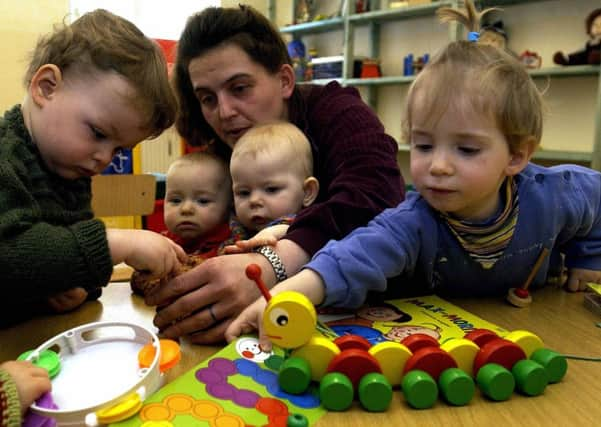Ian Murray: Tackling ‘cost of living’ crisis


What it highlights is that some of the jobs created in Edinburgh and the wider economy are low-paid, part-time, zero-hour, or forced self-employed jobs. This results in an economy which works better for those at the top, but many individuals and families are working harder, longer and getting paid less. We must resolve this.
It will only be done by addressing the challenges of pay, jobs, housing, childcare and skills. Otherwise, people across the capital will be left to face the cost of living crisis.
Advertisement
Hide AdAdvertisement
Hide AdThe first challenge is pay and jobs. The national minimum wage is one of the proudest achievements of the last Labour government but we must go further by committing to an £8 per hour minimum wage. The minimum wage has become the maximum wage for too many and that is why we must go further and work with employers to pay the living wage.
Also, no government contract should be awarded unless the recipient pays the living wage and creates quality apprenticeships.
In Edinburgh, we have a real opportunity in the growth areas of green technologies, life sciences and financial services. The prospects for high-quality jobs are positive but we must deal with underemployment and zero-hour contracts. That is why Labour has developed a policy banning exploitative zero-hour contracts.
We must also ensure that young people do not lose out and that is why a compulsory jobs guarantee for young people out of work for a year will help to re-skill and give hope to those who have not been able to access employment.
Advertisement
Hide AdAdvertisement
Hide AdSecondly, and related to access to employment is the affordability of childcare. We must be ambitious so that parents who want to work to bring in more income or study to improve career prospects are able to get the childcare they need. That is why Scottish Labour will guarantee a nursery place for every parent who decides to attend a college in Scotland and cap the cost of childcare. We must see childcare as being good for parents, good for children and good for the economy.
Thirdly, is the issue of housing. It is the largest part of my MP postbag. Simply, we must provide more social housing. The consequence of a lack of investment in affordable housing has forced many into the much more expensive private rented sector. This hits people’s disposable income hard, leaving less for those everyday essentials. I fear Scotland’s planning system isn’t helping and the proposed local development plan for the city is failing to address affordability.
Fourthly, it must be about education and skills. I was the first in my family to go to university and I want that opportunity for all who aspire to it. However, it is not just about higher education but valuing equally the 50 per cent of young people who do not go to university.
Education in whatever form, at whatever level, creates a skilled economy and that resolves the key skill shortages. It is skills and education that provide the progression to and within employment.
Advertisement
Hide AdAdvertisement
Hide AdThese are just some of the challenges we face. If we address them we would be aspiring to a highly skilled, highly paid, highly productive workforce that deals with the cost of living crisis and provides opportunity for all. If we do, then those income tax receipts will rise again.
Our hard work is recognised
I was delighted to be named as the 15th most responsive MP out of a total of 650 in the UK in a recent league table published by writetothem.com and conducted by the charity My Society.
It follows a prestigious parliamentary award for community engagement. It is representative of my strong belief that as a Member of Parliament, my first and most important responsibility is to my constituents – communicating with them and prioritising their issues and needs whilst representing them in parliament – with up to 700 e-mails a day a lot of the credit goes to my office.
Get involved in devo debate
The Smith Commission has been set up to work with all political parties and the public to come to an agreed position on more powers for the Scottish Parliament. This process must not be about politicians talking to each other, so make sure you have your say before October 31 to [email protected].
Momentous decision
Advertisement
Hide AdAdvertisement
Hide AdParliament voted on Monday to recognise Palestine as a state. It is a historic decision that goes some way to helping along the delicate peace process.
Cutting back on carbonisation has to be a priority
Last month, Ed Miliband made a radical policy announcement in an area we still don’t talk enough about: the environment and climate change.
I was pleased to hear him spell out that a Labour government elected in 2015 would decarbonise the electricity sector by 2030 – by increasing focus on building the green economy. I first put this to Parliament last year through my Decarbonisation Bill, which unfortunately was not taken up by the current Lib Dem-Conservative coalition Government, but I did get cross-party support. This pledge will help Scotland, where we already have a large and growing renewables sector, and crucially also means skilled jobs and investment for our young people.
While we all need to do our bit – whether it is cycling to work as I do as a keen cyclist, or insulating our homes – it is Governments across the world who have the power to make transformative change for our planet. A big part of this is decarbonisation of our energy and getting climate change back on the top of the international agenda where it belongs.